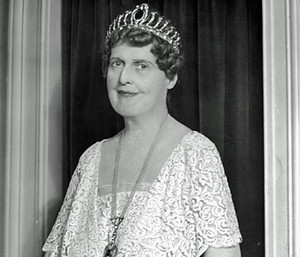
Florence Foster Jenkins had a dream. She wanted to be a famous opera singer. The problem was she couldn’t actually sing.
Well, she could sing. Just not very well. Let’s listen, shall we?
If you can’t watch the video above, let me try to do it justice with a description. It sounded like two sick cats fighting over a tin can full of marbles. It was like a box of accordions being dragged behind a wandering troupe of Vietnamese folk musicians. It was the sound your elderly grandmother makes as she takes a fatal tumble down a flight of stairs.
So how did a woman like that become an opera singer? Well, basically it came down to a large inheritance and a legendary capacity for self-delusion. Not to mention a healthy dose of syphilitic brain damage.
Florence was born in Wilkes-Barre, Pennsylvania in 1868. Early on, she discovered a love of music and was actually something of a child prodigy on the piano. She was so good that she was invited to play at the White House during the Hayes administration.
But, Florence didn’t want to play the piano, she wanted to sing. So, she asked her father if she could go to Europe to study Opera.
Presumably having heard her singing voice, her father took a long draw on his pipe, worked his lip under what was probably a pretty impressive mustache and said, “No.”
Betrayed, and set on revenge, Florence eloped with a local doctor named Frank Jenkins. Unfortunately for Florence, the good doctor had a predilection for ladies of the evening and contracted a case of Syphilis, which he promptly spread to Florence. This being the 19th century, that wasn’t grounds for a divorce, so Florence set out on her own while still legally married to the man whose name she would keep the rest of her life.
Florence made a meager living giving piano lessons until an arm injury stopped her from playing. In 1900, he and her mother, Mary, moved to New York where Florence met her second, common law husband, St. Clair Bayfield in 1909. By this time her Syphilis was doing what Syphilis does, and virulently attacking her brain.
In that same year, her wealthy father died, leaving Florence with the funds she needed to bankroll her own singing career. So, that’s just what she did, renting out concert halls to give private recitals. She hand delivered invitations to these recitals, making sure never to invite any professional critics.
Her performances were marked with mistakes in pitch, timing, and pronunciation of the foreign words that are sort of necessary to pronounce correctly when you’re singing opera. Her accompanist was forced to make frequent adjustments to his playing to account for her tendency to rapidly switch tempo and pitch, which can be heard on the recordings that survive.
Florence became the celebrity she wanted to be, though not for the reason she would have hoped. Word got around the city about her “so bad it’s good” performances and it became something of an inside joke among the New York elite to send friends to a show with purposely vague reviews. One critic wrote that her singing was “like the untrammeled flight of some great bird.”
The ultimate payoff was to go with a friend who expected to hear a lovely rendition of The Magic Flute and then watch the expression of bewilderment on their face as they tried why someone who was such a terrible singer would sell tickets to a recital.
By popular demand, Florence was finally convinced to give a performance at Carnegie Hall at age 76, where tickets quickly sold out. People stood outside waving hundreds of dollars in the air in the hopes of securing a ticket. The most valuable seats were in the back where people would fall to their knees behind the seats doubled over in laughter. People advised each other to bring handkerchiefs to shove in their mouths. Others had to be carried out after laughing so hard.
Meanwhile, Florence took the laughter as adulation rather than derision. As she walked off the stage to raucous applause, she must have thought this moment was the culmination of her life-long dreams to sing opera at Carnegie Hall.
The next morning she read the reviews. One reviewer praised her great range saying, “She can sing anything except notes.” Another said, “It was largely a recital without voice for the tones that Madam Jenkins produced were tiny. Much of her singing was hopelessly lacking any a semblance of pitch but the further a note was from its proper elevation the more the audience laughed and applauded.”
Two days later, Florence suffered a fatal heart attack. Some attribute her demise to the stress of learning what people actually thought of her singing.
Her long-time accompanist, Cosme McMoon, argued that it was unrelated. He stated in an interview that her capacity for self-delusion was such that she could have easily convinced herself that it was the reviewers who were wrong.
Regardless of the truth of the matter, you have to admit, she died a famous opera singer, just like she wanted. And now she’s being played in a movie by Meryl Streep. So maybe the last laugh is really hers.
In the words of Florence Foster Jenkins, “Some may say I can’t sing, but no one can say I didn’t sing.”


